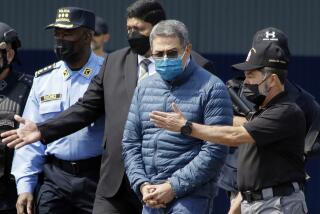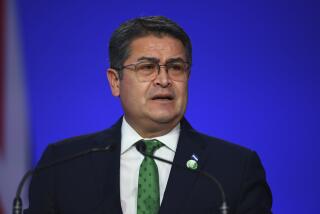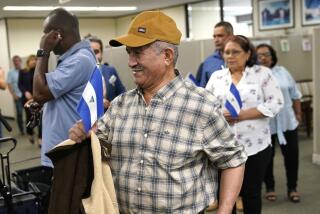Noriega Gets 40 Years in Prison : Sentence: Penalty amounts to a life term, as former Panama strongman, now 58, is unlikely to win parole. He was convicted in April on eight drug-related counts.
- Share via
MIAMI — Former Panamanian strongman Manuel A. Noriega, deposed by the U.S. invasion of Panama more than two years ago, was sentenced to 40 years in prison Friday for his conviction on eight counts of racketeering, conspiracy and cocaine-smuggling.
The sentence is expected to amount to a life term for Noriega, who is 58 years old.
Word of the lengthy prison term was greeted by President Bush--who had ordered the invasion--as “a fitting punishment for drug crimes that have harmed all Americans.”
“It demonstrates that international drug felons are not above the law--no matter how great their wealth, their status or their armed might,” Bush said in a statement.
Bush, who was in Kennebunkport, Me., after concluding his European trip, also said the sentence shows that the U.S. invasion of Panama, which led to Noriega’s arrest in December, 1989, “led to the conviction and just punishment of an unrepentant criminal. For that, Americans, and our allies abroad, have reason to be proud.”
In Panama City, Reuters reported, drivers honked car horns in celebration and small groups of people gathered to wave white handkerchiefs and throw confetti in celebration of the sentence. President Guillermo Endara issued a statement, saying: “The people of Panama are relieved to learn the news from Miami because this definitely closes a painful chapter in the history of our country.”
Noriega was convicted in April of allowing Colombia’s Medellin drug cartel to ship tons of U.S.-bound cocaine through Panama in return for millions of dollars in cash payments. His attorney, Frank A. Rubino, vowed to appeal the verdict, saying that unless the conviction is reversed, Noriega “probably will die in prison.”
Immediately before the sentencing, the former Panamanian dictator stood in ramrod-straight military style in the courtroom and railed against the United States. In a rambling speech that lasted nearly three hours, he charged that he had been seized and prosecuted for political reasons and that the President was “guilty of causing the deaths of innocent people” in Panama.
He ridiculed Bush’s stated reasons for the invasion of Panama--to protect the Panama Canal and the lives of Americans there who were threatened by Noriega.
“There was never any danger to the canal or to American citizens in Panama,” Noriega told the court. “Panama was invaded because I was an obstacle to President Bush, who preferred me dead.”
But Noriega boasted that he survived the invasion.
“As they were unable to kill me yesterday, they bring me here today so that you will do them the favor of killing me,” he told U.S. District Judge William M. Hoeveler.
Noriega, who had neither spoken nor taken the witness stand in his own defense during the seven-month trial that ended April 9, said he had been an ally of the United States for years and often had cooperated with the Central Intelligence Agency.
But the Ronald Reagan Administration, he said, brought criminal drug charges against him in 1988 after he had rejected a U.S. request in December, 1986, to commit Panamanian troops against the leftist Sandinista government in Nicaragua. The Administration at that time was seeking help for the Nicaraguan rebel movement, known as the Contras.
Dressed in his khaki full-dress ceremonial general’s uniform, with gold shoulder boards, Noriega spoke through an interpreter to Hoeveler. Referring to the Reagan Administration request, Noriega said:
“I told them, no, I would not allow them (Panamanian troops) to harm my neighbors. At that time I was their ally. But I suffered the consequences.”
Noriega said that in May, 1988, the Administration offered to drop the Miami grand jury indictment that had been returned against him three months earlier, on condition that “I hand over my country to a new ruler and absent myself for a period of time.” There were press reports of such negotiations at the time.
In sentencing the former dictator Hoeveler said: “I’m not privy to all the factors that gave rise to the invasion (in December, 1989). But politics were not a part of this case. I was presented with an indictment, and it was my function to see that the general got all the rights he was entitled to under the law.
“The evidence was presented to a very fine jury. They found him guilty of eight counts beyond a reasonable doubt, regardless of what the general feels was the real reason for his indictment.”
Co-prosecutors Michael P. Sullivan and Myles Malman scoffed at Noriega’s statements. Sullivan termed them “ridiculous allegations and accusations . . . figments of his imagination.”
Added Sullivan: “Gen. Noriega misses the point. This was never a political trial.”
Hoeveler said Noriega would remain for the next 60 days at the medium-security prison south of Miami, where he has been kept since being flown in shackles on a military plane to Florida in early January, 1990.
During that 60-day period, the judge said, Noriega’s attorneys would have an opportunity to recommend where he should be permanently incarcerated. But federal officials said it was likely to be the maximum security penitentiary at Marion, Ill., where major drug offenders and the most hardened criminals are held.
Marion also is one of the few federal prisons that is not plagued by overcrowding. It has sufficient cells to allow prisoners to be isolated for their own protection, as is likely to be the case with Noriega.
Defense attorney Rubino told Hoeveler that the former strongman was a prisoner of war and should be housed on a military base. Hoeveler rejected the argument for the time being but said he would allow Rubino to raise it again in a detailed memorandum.
Sitting in the second row of the crowded courtroom were the parents of U.S. Army Pfc. Jim Markwell, who was among the first soldiers killed in combat when he parachuted onto the runway of Omar Torrijos Airport with an early wave of Army Rangers on Dec. 21, 1989.
William Rouse of Cincinnati, his stepfather, said, “His mother and I just wanted to see Gen. Noriega go to jail.”
Noriega’s wife, Felicidad, and three daughters wept quietly when the general was led away by federal marshals after the sentencing.
Several legal experts, including his own attorney, acknowledged it was unlikely Noriega ever would be released from prison.
Although most white-collar criminals and officials convicted of political corruption are eligible for parole after serving about a third of their sentences, Noriega’s case is different because of his reputation as a violence-prone leader and the anti-societal nature of his drug offenses, legal experts said.
“I would expect to see him serve out a full term,” William G. Hundley, a veteran Washington criminal defense attorney, commented. “It’s doubtful he would ever be paroled.”
Others agreed. Mark Schnapp, a Miami defense attorney and former federal prosecutor, said the U.S. Parole Board probably would exercise its discretion to keep Noriega in prison even after he could be eligible for parole early next century.
“The board takes into consideration such factors as a defendant’s gross misuse of public office or his involvement in crimes of violence, like drug-related activity, both of which are present in this case,” Schnapp said.
During his lengthy remarks in court, Noriega also said U.S. officials once had sought to have Panamanian doctors quietly murder the Shah of Iran when the former ruler was lying ill with cancer on the Panamanian island of Contadora.
He gave no further details but placed the attempt in 1979, saying officials hoped it might lead to freedom for American hostages in Iran.
He also said there was evidence that the Reagan Administration had had a hand in an airplane explosion that killed his predecessor, Omar Torrijos, in 1981. Noriega also had been accused of involvement in the episode, which led to his rise to power.
These accusations, like others, were dismissed by the government as fantasies.
Times staff writer James Gerstenzang in Kennebunkport, Me., contributed to this story.
More to Read
Sign up for Essential California
The most important California stories and recommendations in your inbox every morning.
You may occasionally receive promotional content from the Los Angeles Times.













